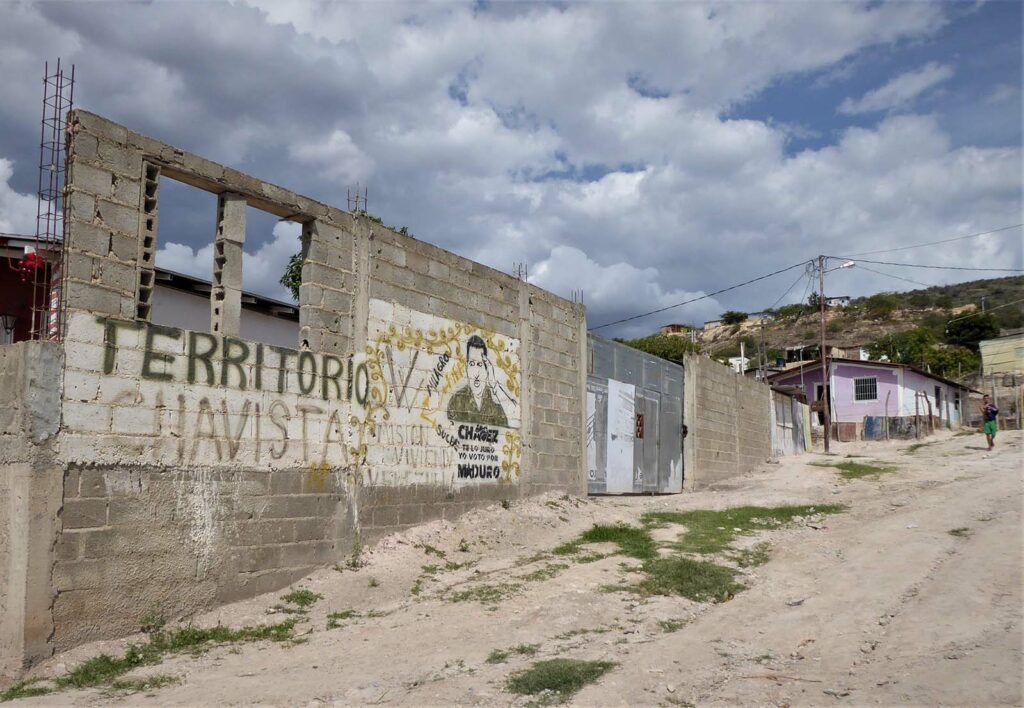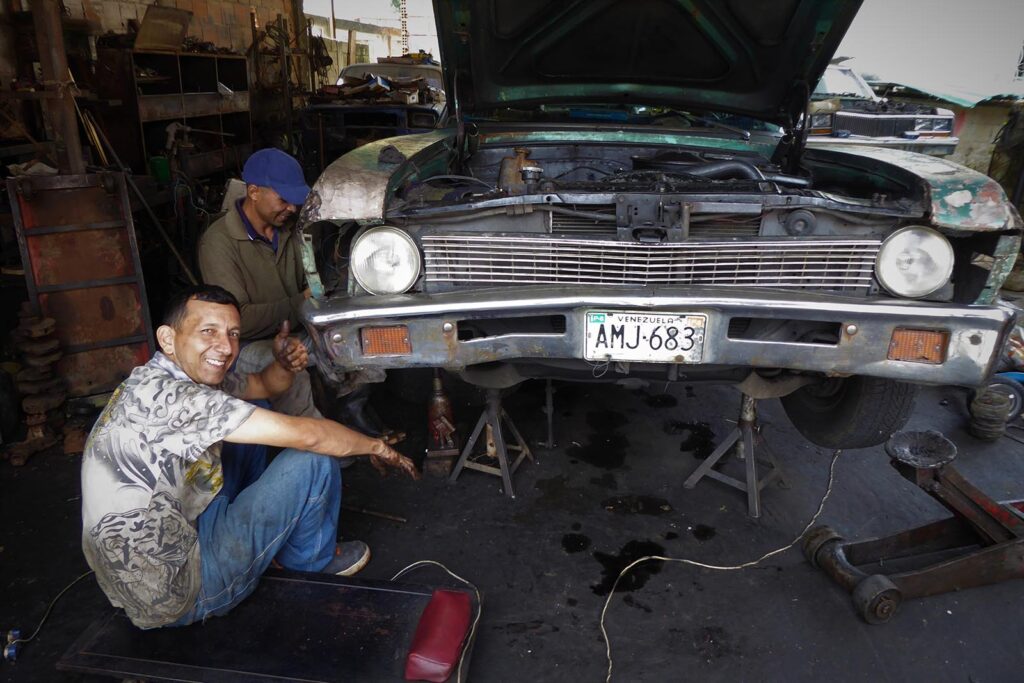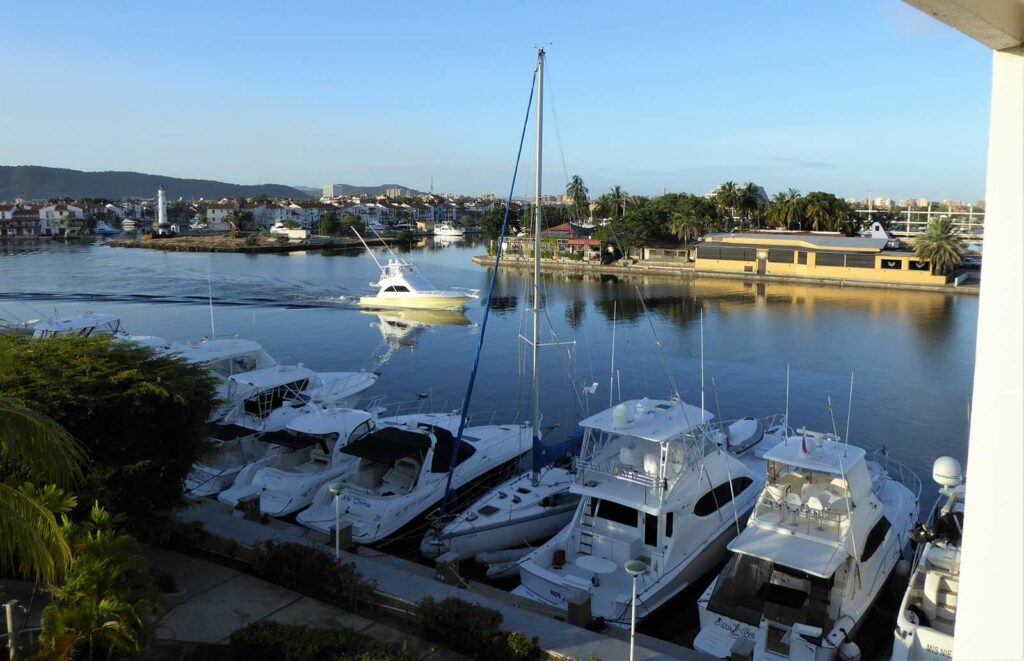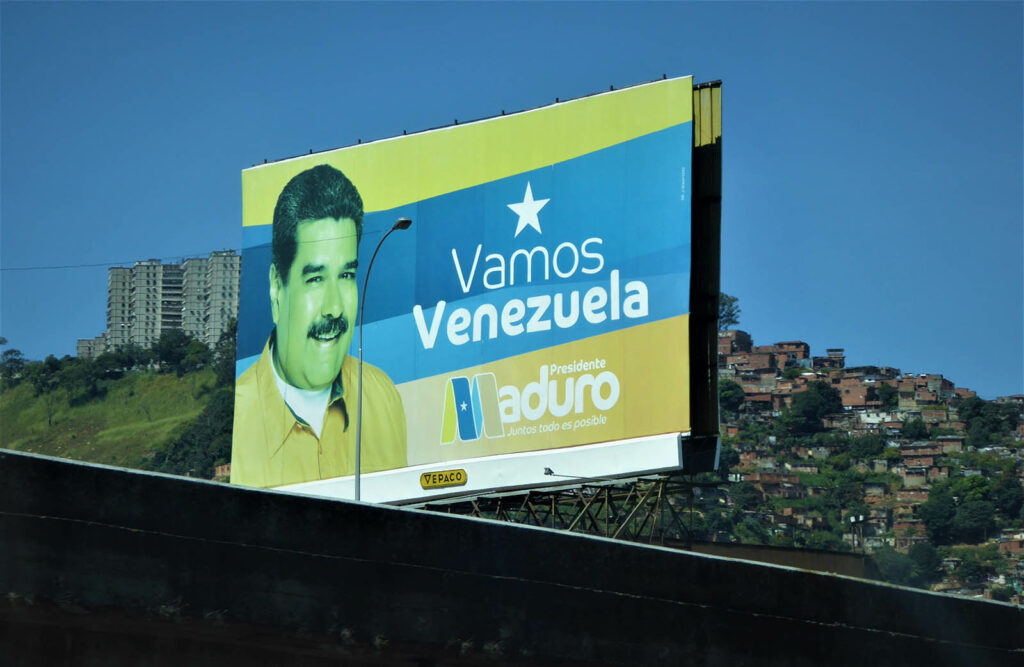Going local goes further afield with a trip to Venezuela where petrol is free and the shops are full but there’s no money to spend.

Having flown from Bogotá to Caracas, then travelled 13 hours by car to a dusty shanty on the edge of an inland city, I’m surprised to find myself chatting with former Colombian FARC guerrillas. A decade back, they fled persecution, crossing into Venezuela and taking shelter in Chávez’s socialist paradise. So how did that work out?
“We still support the Maduro government. But, yeah, we need help”.
Even as we’re talking, a gas-guzzling 1970s V8 rumbles over the broken tarmac nearby. The old car is the suburb’s last form of transport since the servicio municipal went bust, literally, judging by the skeletal remains of Chinese buses littering the barrio.
Then suddenly there’s the sound of steel scraping on stones as the car’s front right axle collapses. People get out and start walking.
“The wheel came off,” comments one chavista, though it’s not clear if he means the car stuck in the road, the transport system, or the whole country in general. Maybe it’s all three.

It’s towns like this – far from Caracas – where the economic meltdown of this formerly wealthy country is most visible. Electricity is intermittent. Water comes once a month. A month’s pay buys food for two days. If you suck up sufficiently to the ‘Jefe de la Calle,’ a political street boss, you might get the monthly CLAP, a state food box with pasta and rice and a tin of sardines.
But if you live in Maracaibo, the sky-scrapered city perched on the western shore of the oil-rich sea lagoon of the same name, you’ll get the food box once a year. Or never. The ‘opposition’ city – once the petro-industrial hub of the oil boom – has been worst hit by this man-made crisis.
In a fishing village along the Maracaibo lagoon shore, kids come to a volunteer’s house to collect an arepa with egg for lunch. Except it’s also their breakfast. And for some, their dinner too. A few kids have sunken eyes and yellow hair, meaning diet deficiencies and chronic food shortage.
Having said that, there is food around. In Caracas, the shops are full. It’s just that most people don’t have any money to shop with. Hyperinflation sent the local bolivar spiralling into nothing while a dollarised economy and perverse fiscal rules punish the impoverished majority who scrape by on worthless currency and government hand-outs.
“If we don’t get foreign currency, we’re screwed,” explains my driver. He earns some greenbacks, so he can keep the wolf from the door.
Follow our coverage from the Venezuelan refugee crisis.
Most Venezuelans get some foreign currency that dribbles in from overseas. But it’s not much. Sometimes a few soles from Peru, or pesos from Colombia – from those scrawny guys washing windscreens at the traffic lights in Bogotá. Not only are they barely surviving in Colombia’s capital, they’re also sending every spare peso home to keep their kids, parents, aunts and uncles alive. Think of that next time you shoo them away.
Not only are those window washers barely surviving in Colombia’s capital, but they’re also sending every spare peso home to keep their kids, parents, aunts and uncles alive. Think of that next time you shoo them away.
Strangely though, if you have a car in Venezuela, fuel is free. The only cost is the time spent queuing to fill up and maybe a pack of biscuits for the petrol pump attendant. In fact, along with state-subsidised water, electricity, and gas, petrol has always been ridiculously cheap here – Venezuela is one of the world’s most prominent producers.
Cold comfort
In Caracas, the capital, there seems to be electricity in excess. In fact, during my stay, the overactive air-conditioning turned out to be an unexpected problem. My hotel, perhaps expecting a delegation of polar bears, set the aircon to 2 degrees. And not just in the hotel room, but the whole building.
I shiver my way through reception to the chilled lift, enter my frigid room to search for the switch to turn the aircon off. Even then it hisses like some thermo-Terminator and keeps seeping frozen air. So while half the country has power cuts, Caracas, which is Maduro’s Potemkin village, wastes megawatts on catching colds. Greta Thunberg would have a cow.
My hotel, perhaps expecting a delegation of polar bears, set the aircon to 2 degrees. And not just in the hotel room, but the whole building.
I do find some tropical heat at a coastal resort in Anzoátegui, a six hour’s drive east of the capital. Dotted around a luxury marina are luxury flats, luxury hotels, and luxury restaurants. In the blue water float luxury yachts. Behind them sway luxuriant palm trees. The only thing missing is Don Johnson with a snub-nosed pistol shoved in his shorts.
The next morning, at the buffet breakfast, there are plenty of handguns amid an arsenal sported by 20 tough-looking military types. They obviously didn’t notice the large ‘No Weapons Allowed’ sign on the restaurant door. I nervously queue for my scrambled egg and a slice of watermelon.
“They’re protecting an enchufada, he’s staying here with his family,” says the local driver I’ve hired. Enchufada means ‘plugged in to power,’ as in the electric outlet. But in Venezuela, it refers to a corrupt government crony who drains the country’s wealth. Many have sunk their cash into flats and yachts in Anzoátegui. The bigger fish have houses in Monaco, according to local lore.

Still, an army of twenty bodyguards seems a little excessive for just one politician. He can’t be too popular.
Neither is his boss. Apart from the confused Colombian ex-guerrillas, no one I talk to has a kind word for Maduro. Even the cult-like love of Chávez is a half-remembered dream. Did he really hand out houses, free services, health, and cash windfalls?
Maduro now pops up on evening TV promising an inflow of medicines to empty hospitals. Some health workers have been stealing supplies, he explains, so he’s tasking the National Guard – “people I can trust” – to take care of distribution so everyone can get “the free health they deserve.”
My lunch companion splutters over her coffee. “Some Guardia Nacional chief just opened a shop in my barrio selling the stolen medicines.”
Nationalised crime
Unfortunately, Venezuela’s gone beyond the petty pocket-lining common to many countries on this continent and graduated to criminal state status. The government isn’t infiltrated by criminal gangs, it is the criminal gang, with dozens of underling gangsters to do its dirty work.
These have fun names like Tren de Aragua (The Araguan Train), Pranes – which stands for Preso (Imprisoned) Rematado (Auctioned) Asesino (Killer) Nato (by birth), and Cartel de Los Soles (Cartel of the Sun). But subjugating a hungry nation requires extra muscle, so Venezuela is fair game for Colombia’s ex FARC, ELN, EPL, Rastrojos, Urabeños and, popping over from the Middle East, Hezbollah and Hamas.
It is through countries like Iran that the Venezuelan politicians are enriching themselves by fencing 100 tonnes of gold a year, mined by criminal gangs in the Amazon region. Meanwhile the state oil company PDVSA – the one handing out free fuel – has faked million-dollar oil deals and even ‘builds’ fake refineries to launder USD$40 billion proceeds from organised crime in central and south America.
This explains why there is no ‘Evo’ moment in Caracas. In Bolivia, a population was faced off against a real government, so protesters had leverage. And in Bogotá, maybe too. But Venezuelans are battling a nationalised criminal enterprise. Complain too much and you’ll be silenced with extreme prejudice. Last year, 7,000 people were shot dead ‘resisting the police,’ often following opposition rallies.
Meanwhile, Maduro’s back on TV with some Khrushchev-style fist-pumping. The camera pans to a table full of apparatchiks chanting “Leales siempre, traidores nunca”. Always loyal, never traitors.

But the Big Banana looks tired, like he wants to chuck it in and sail off in his superyacht to Monaco. But he can’t, explains a friend, since he’s a “puppet for the military chiefs.”
“He couldn’t resign if he wanted to.”
Meanwhile blaming foreigners is the favoured tactic for a cornered caudillo. Billboards all over Caracas say: “No Más Trump.” True, the US has spearheaded international sanctions and the freezing of millions of overseas assets. Then there was the oil price crisis, probably another gringo trick to drive down difficult nations.
It’s that same oil that funded those boom years and fantastical public spending that set Venezuela apart from its neighbours. People really did have it good. But Chavism’s drive to bridge the inequality gap has backfired in a major way. The country is now a filthy rich political class, a missing middle class (most fled), and the poor, very poor and extremely poor.
I struggle to make sense of it all. But my driver nails it as we queue for the giveaway fuel.
“Anyone could see their plan was never sustainable. You can’t go on forever just giving stuff for free,” he says.
Venezuelans are now paying the price.





